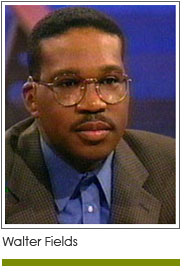 The killing of Florida teenager Trayvon Martin has understandably sparked outrage across the nation. Considering how the Black youth was gunned down by a neighborhood watch captain as he innocently walked down a street has left people numb, bewildered and angry. It is a chilling example of the vulnerability of young Black men in this nation and the degree to which their lives are discounted in a society that has made being Black a criminal offense. Trayvon’s death has again forced Black parents to sit down with sons and have the “talk,” the painful admission that their sons will grow up under perpetual suspicion and as they reach manhood it will manifest as outright hatred of their very existence.
The killing of Florida teenager Trayvon Martin has understandably sparked outrage across the nation. Considering how the Black youth was gunned down by a neighborhood watch captain as he innocently walked down a street has left people numb, bewildered and angry. It is a chilling example of the vulnerability of young Black men in this nation and the degree to which their lives are discounted in a society that has made being Black a criminal offense. Trayvon’s death has again forced Black parents to sit down with sons and have the “talk,” the painful admission that their sons will grow up under perpetual suspicion and as they reach manhood it will manifest as outright hatred of their very existence.
As anger brews over Trayvon’s death and the failure of Florida officials to arrest George Zimmerman, the man who killed him, another case in Mississippi also amplifies the plight of Black men. In that case three young white men – ages 19 and 20 - pled guilty to beating up a 47 year-old Black man, James Craig Anderson, and then killing him by running over Anderson in a pickup truck. The assailants made a sport of preying upon African-Americans in the Jackson, Mississippi area. In both of these incidents Trayvon Martin and James Craig Anderson were victimized for breathing while Black. The state of being a Black male in America significantly impacts mortality through random victimization and a higher incidence of stress driven diseases. It is not a matter of driving while Black or walking while Black; just being Black and male in America puts one at risk of meeting an early demise.
Black males and young Black men in particular, are confronted with hate from all quarters. Trayvon’s life was taken by a Hispanic male. James Craig Anderson was killed by white men. In some cases of police brutality Black officers have been the offenders. In many communities Black gang members murder young Black men over “territory” they don’t own and can’t afford financially or control politically. The entertainment industry plays on the libido of young Black men and seduces them with a misogynistic representation of “manhood.” Young Black boys are classified as “troublemakers” or “deficient” by white female school teachers who can’t reconcile the energy and dynamism exhibited by Black boys with their academic potential. As young Black boys who were cast away in school develop into Black men who are marginalized in the workplace and herded into correctional facilities, the African-American community is left with a fading memory of the productive and capable Black man. Sadly, in many neighborhoods Black residents have cosigned the demonization of Black boys and accepted as a fait accompli that these young men are destined for prison. Is there any love for Black boys?
Many of the tears being shed over the loss of young Trayvon Martin are flowing over the realization of the helplessness of the situation for all Black boys. The feeling of powerlessness is overwhelming. I know. I have felt it. In 1990 I had to accompany the best friend of Phillip Pannell, a Teaneck, New Jersey youth killed by township police, to Phillip’s funeral. The young man had been arrested by local police on a bogus rioting charge but the county prosecutor, a man of principle, arranged to have him turned over to me so he could attend the funeral. We arrived at the church one hour before the service so he could pay his respects to his friend. It was one of the toughest hours of my life. Very rarely am I at a loss for words but what do you say to a young man who sees his friend, a 16 year-old kid, laid in a coffin and looks to you and ask, “Why?” As we sat on the back pew of the church, alone, it became a conversation between two young Black men, one 30 and the other 16. We both cried, not just for Phillip, but for ourselves.
Over the last week I have really tried to process Trayvon Martin’s death. I have prayed. I have cried. I have screamed. I have been mad at myself for not doing enough. I have been mad at others who are in a position to make a difference for doing too little. I have had restless nights and taken long walks to suppress my anger. It all brings me back to the same place. America. The truth of the matter is that this is the nation we have allowed to be forged by hate. Every act of indifference toward claims of racism, every criticism of an activist who dares to challenge institutional bias, every vote that sits home on Election Day, every dollar spent on material possessions and not invested in our youth; our complicity helps build the prison cells and dig the graves.
Walter Fields is Executive Editor of NorthStarNews.com.














